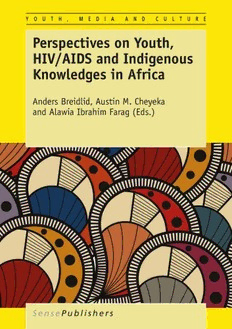
Perspectives on youth, HIV/AIDS, and indigenous knowledges PDF
Preview Perspectives on youth, HIV/AIDS, and indigenous knowledges
PerspectivesonYouth,HIV/AIDSandIndigenousKnowledges YOUTH, MEDIA, & CULTURE SERIES Volume 4 Series Editors Shirley R. Steinberg, University of Calgary, Canada Awad Ibrahim, University of Ottawa, Canada Editorial Board Annette Coburn, The University of the West of Scotland Giuliana Cucinelli, Concordia University, Montreal, Canada Rhonda Hammer, UCLA, USA Mark Helmsing, Michigan State University, USA Brian Johnson, Bloomburg University, PA, USA Scope Taking the notion of critical youth studies, this series features top scholars in critical media and youth studies. Coupling edgy topics with a critical theoretical lens, volumes explore the impact of media and culture on youth … and the impact of youth on media and culture. Perspectives on Youth, HIV/AIDS and Indigenous Knowledges Editedby AndersBreidlid OsloandAkershusUniversityCollege,Norway AustinM.Cheyeka UniversityofZambia,Zambia and AlawiaIbrahimFarag AhfadUniversityforWomen,Sudan SENSEPUBLISHERS ROTTERDAM/BOSTON/TAIPEI AC.I.P.recordforthisbookisavailablefromtheLibraryofCongress. ISBN978-94-6300-194-6(paperback) ISBN978-94-6300-195-3(hardback) ISBN978-94-6300-196-0(e-book) Publishedby:SensePublishers, P.O.Box21858, 3001AWRotterdam, TheNetherlands https://www.sensepublishers.com/ Printedonacid-freepaper Allrightsreserved©2015SensePublishers Nopartofthisworkmaybereproduced,storedinaretrievalsystem,ortransmitted inanyformorbyanymeans,electronic,mechanical,photocopying,microfilming, recording or otherwise, without written permission from the Publisher, with the exceptionofanymaterialsuppliedspecificallyforthepurposeofbeingenteredand executedonacomputersystem,forexclusiveusebythepurchaserofthework. TABLE OF CONTENTS Acknowledgements vii 1. Introduction 1 Anders Breidlid, Austin M. Cheyeka and Alawia Ibrahim Farag Section One 2. Indigenous Knowledges, the Global Architecture of Education and Health, and the HIV/AIDS Pandemic: Towards a Paradigm Shift? 9 Anders Breidlid 3. The Zambian Bantu Indigenous Explanation of HIV and AIDS 25 Austin M. Cheyeka 4. Stigma and the Process of Deconstructing the Social Identity of Women Living with HIV/AIDS in Sudan 41 Hwiada Mahmoud Abu Baker and Alawia Ibrahim Farag 5. HIV and AIDS and Teacher Education in Zambia 61 Trinity Chikwanda 6. School and Home Sexuality Discourses in Selected Girls’ Secondary Schools in Lusaka 77 Heather Munachonga 7. The Sikenge Female Initiation Rite as a Means of Combatting HIV/AIDS 97 Mushaukwa Matale 8. Perceptions of Condom Use and Sexual Risks among Out-of-School Youths in the Nakonde District, Zambia 113 Samuel Silomba 9. Alleviating HIV/AIDS through Sports and the Ubuntu Cultural Philosophy in Zambia 129 Kabanda Mwansa Section Two 10. How the Social Context of Five Former Namibian Street Boys Has Conditioned Their Experience with Schooling 145 Sigbjørn Solli Ljung v TABLE OF CONTENTS 11. Lessons from Children’s Participation in CEYA Capoeira Classes, Cape Town, South Africa 163 Live Grinden with Louis Royce Botha About the Contributors 181 vi ACKNOWLEDGEMENTS We are grateful to the Norwegian Centre for International Cooperation in Education (SIU) and the Norwegian Agency for Development Cooperation (NORAD) for funding the master’s program (NOMA: Norad’s Programme for Master Studies) in the four countries and to the Department of International and Interpreting Studies, Faculty of Education and International Studies, Oslo and Akershus University College, for funding the production costs of this book. vii ANDERS BREIDLID, AUSTIN M. CHEYEKA AND ALAWIA IBRAHIM FARAG 1. INTRODUCTION This book is the result of academic cooperation between scholars in Norway, Sudan, Zambia, and South Africa, and is the endpoint of a journey that started in Omdurman, Sudan in 2007, when scholars from the four countries met to discuss a master’s course in international education and development across geographical and epistemological borders. In December 2012, the professors and the graduated master’s students met at a conference in Omdurman and presented papers based on the students’ theses. The success of the conference and the high quality of the papers inspired us to consider publishing a book based on the papers (a video of the conference has already been made), and after a very strict selection process the chapters for this book were chosen. The book draws on studies carried out in Sudan, Zambia, Namibia, and South Africa. Because the master’s course in international education and development had a thematic focus on HIV/AIDS, most of the chapters in the book deal with the HIV/AIDS pandemic in various ways. Moreover, because youth are the group most vulnerable to HIV/AIDS due to their biological and psychological stages of development, as well as the social and economic contexts that expose them to risk and vulnerability, the bulk of the chapters discuss the complex discursive spaces that youth inhabit and navigate. The concept of “youth” is conventionally viewed as exclusively linked to age, and the United Nations defines “youth” for statistical purposes as persons between ages 15 and 24 (UN, 1981). However, youth as a concept is flexible and highly context-related, depending on factors such as their dependency on their original household and own family, their capacity to sustain themselves, and their educational situation. Drawing on social theory, the book offers insight into ways in which various contexts shape the formation of youth identity and how youth respond to pertinent aspects of their lives, including the risk of HIV infection. Sexual identity is a key marker of who people identify as and how they assign meaning to their lives, and as such is a central feature in the book. The assumption the book makes is that people’s (and, in the case of this book, youths’) lives are mediated in social contexts in which they assign meaning to their experiences and live in contemporary societies that they also contribute to. The book identifies dominant narratives in the identity-creation process among youth, and it links this to risk, sexual risk behavior in particular, and HIV and AIDS. The interlocking concepts of social identity, power, inequality, sexuality, vulnerability, and resilience are brought together in most chapters of this book to highlight the complexity of the discursive space that youth inhabit and navigate. A. Breidlid et al. (Eds.), Perspectives on Youth, HIV/AIDS and Indigenous Knowledges in Africa, 1–6. © 2015 Sense Publishers. All rights reserved.
